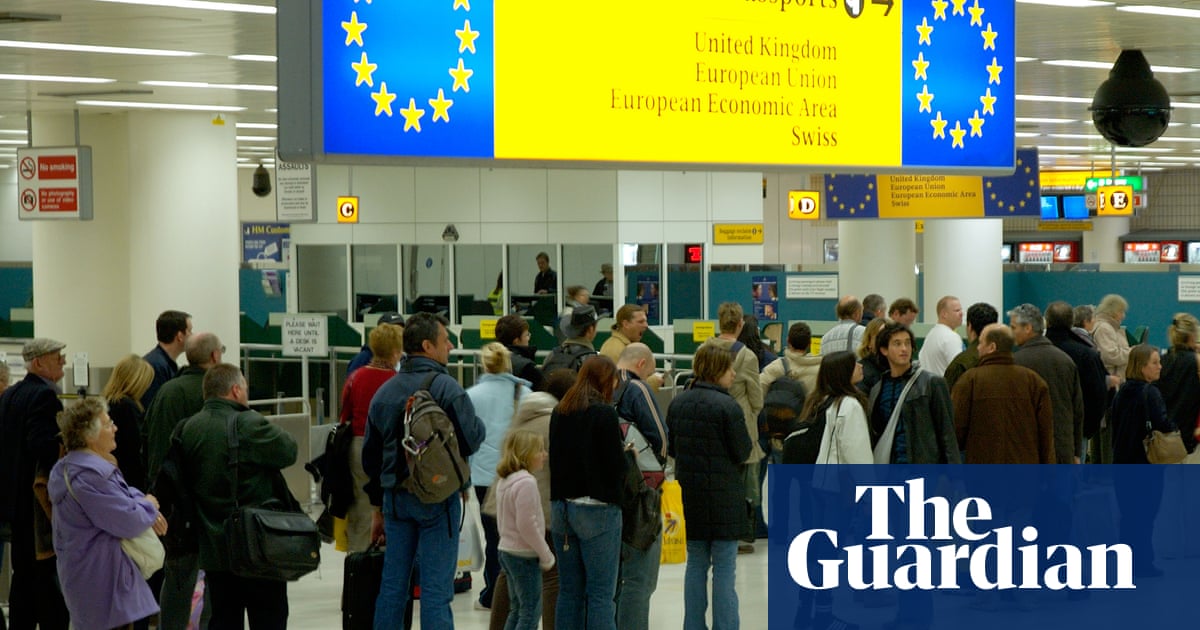British holidaymakers could face shorter airport queues this summer with negotiators on the verge of striking an agreement for UK passport holders to use e-gates acrossEurope.
Downing Street said on Saturday that it was poised to strike a deal with the EU that would improve things forBritish families facing “queues on holiday”.
The Guardian understands officials on both sides are in talks about allowing British travellers to use e-gates reserved for people from the EU or European Economic Area when arriving at airports in Europe, ending the current two-queue system.
The issue forms part of negotiations ahead of thehighly anticipated UK-EU summitin London on Monday, which willfocus on a security and defence pact.
SinceBrexit, British travellers have had to queue to have their passports stamped when arriving in many European airports, with e-gates reserved for EU passport holders and members of the European Economic Area.
Some airports in Portugal and Spain have introduced e-gates that accept British passports, though the Foreign Office still encourages UK travellers to get their passports stamped.
Rishi Sunak’s governmentsought an agreement to open e-gatesacross the EU to British passport holders, but this never materialised. Travellers from the EU have continued to have access to UK e-gates, despite Brexit, without needing to have their passports stamped or checked by a border officer.
An agreement enabling British travellers to use European e-gates could reduce airport queueing times considerably, particularly if it lifts the requirement for passport stamping.
The EU is preparing to set up a new entry and exit system that will apply to British travellers in October. The scheme, which was meant to be launched in 2022 buthas been delayed several times, would replace passport stamping but would require British travellers to provide biometric data at the border, such as fingerprints and face scans. A separate EUtravel authorisation systemis also being developed, and is expected to be operational before the end of the year.
The UK has already set up its own travel authorisation scheme for EU and other international travellers which came into force last month. Modelled on the system used by the US, it costs £16 and allows multiple visits to the UK of up to six months over a two-year period.
Several other mobility-related issues are also under discussion by British and European negotiators ahead of Monday’s summit.
The UK is eager to make it easier for musicians and other performing artists to tour in Europewithout undergoing an onerous visa process. The EU haslong pursued a youth mobility dealto allow young Europeans to temporarily live and work in the UK, and vice versa.
The prime minister indicated this weekend that he was open to a youth mobility agreement. Ministers want any such scheme to be time-limited and capped, however, because of Labour’smanifesto commitment to reduce net migration.
Visa barriers for touring artists are unlikely to be lifted on Monday but are expected to be among the issues the two sides agree to explore further.
The two sides are also in talks over a veterinary agreement to reduce barriers for the farming and food industries. Downing Street said the deal would bring improvements for UK producers and supermarkets.
It will be the third trade deal announced by the government in a fortnight, after the conclusion ofa multibillion-pound free trade agreement with Indiaanda deal to lift steel and aluminium tariffsand reduce car tariffs with the US.
Speaking ahead of the EU summit, Starmer said an agreement with Brussels was “another step forward” for the UK and would “be good for our jobs, good for our bills and good for our borders”.
“In this time of great uncertainty and volatility, the UK will not respond by turning inwards, but by proudly taking our place on the world stage – strengthening our alliances and closing deals in the interests of British people,” he said.
Rachel Reeves, the chancellor,told the Guardian this weekendthat the deal would be a “step towards” a deeper and ongoing partnership with Europe. “I am ambitious for our future. This isn’t a one-off. There will be things that we achieve, some concrete outcomes on Monday, but there will also be a step towards where we want to go next,” she said.
